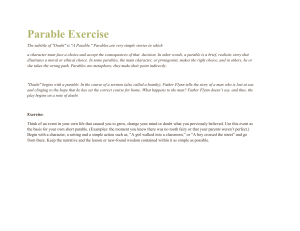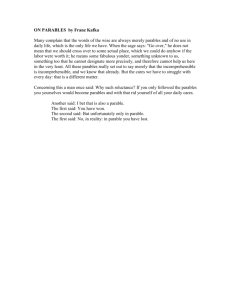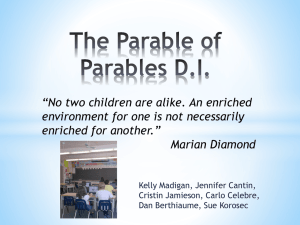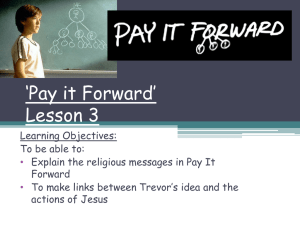Learning journey: The Parables of Jesus Higher Order Thinking Skills / Progression Introduction:
advertisement
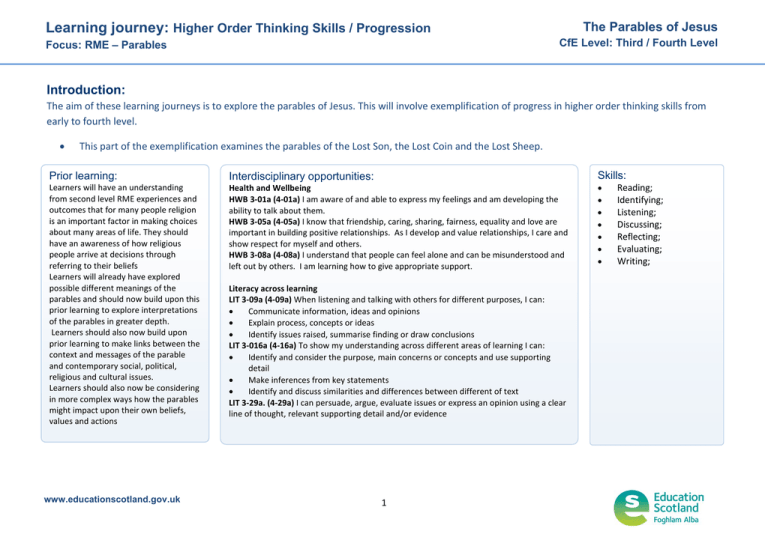
The Parables of Jesus Learning journey: Higher Order Thinking Skills / Progression CfE Level: Third / Fourth Level Focus: RME – Parables Introduction: The aim of these learning journeys is to explore the parables of Jesus. This will involve exemplification of progress in higher order thinking skills from early to fourth level. • This part of the exemplification examines the parables of the Lost Son, the Lost Coin and the Lost Sheep. Prior learning: Learners will have an understanding from second level RME experiences and outcomes that for many people religion is an important factor in making choices about many areas of life. They should have an awareness of how religious people arrive at decisions through referring to their beliefs Learners will already have explored possible different meanings of the parables and should now build upon this prior learning to explore interpretations of the parables in greater depth. Learners should also now build upon prior learning to make links between the context and messages of the parable and contemporary social, political, religious and cultural issues. Learners should also now be considering in more complex ways how the parables might impact upon their own beliefs, values and actions www.educationscotland.gov.uk Skills: Interdisciplinary opportunities: Health and Wellbeing HWB 3-01a (4-01a) I am aware of and able to express my feelings and am developing the ability to talk about them. HWB 3-05a (4-05a) I know that friendship, caring, sharing, fairness, equality and love are important in building positive relationships. As I develop and value relationships, I care and show respect for myself and others. HWB 3-08a (4-08a) I understand that people can feel alone and can be misunderstood and left out by others. I am learning how to give appropriate support. Literacy across learning LIT 3-09a (4-09a) When listening and talking with others for different purposes, I can: • Communicate information, ideas and opinions • Explain process, concepts or ideas • Identify issues raised, summarise finding or draw conclusions LIT 3-016a (4-16a) To show my understanding across different areas of learning I can: • Identify and consider the purpose, main concerns or concepts and use supporting detail • Make inferences from key statements • Identify and discuss similarities and differences between different of text LIT 3-29a. (4-29a) I can persuade, argue, evaluate issues or express an opinion using a clear line of thought, relevant supporting detail and/or evidence 1 • • • • • • • Reading; Identifying; Listening; Discussing; Reflecting; Evaluating; Writing; Learning journey: Higher Order Thinking Skills / Progression The Parables of Jesus CfE Level: Third / Fourth Level Focus: RME – Parables Possible relevant Experiences and Outcomes: Religious and Moral Education: • • • • • • • • RME 3-01a Having reflected upon Christian sources, I can explain some key Christian beliefs about God, Jesus, the human condition and the natural world, and how these beliefs lead to actions for Christians. RME 3-01b Through investigating and reflecting upon how Christians put their beliefs into action, I can reflect upon the consequences of putting my own beliefs into action. RME 3-01c I can explain a range of beliefs which Christians hold about 'ultimate questions' and participate in debates about these. RME 4-01a Having considered key Christian beliefs, I can express reasoned views on these and discuss how putting them into practice might affect individuals and society. I can confidently support my own responses to these issues of belief. RME 3-02a Having reflected upon Christian responses to issues of morality, I can discuss ways in which to create a more just, equal, compassionate and tolerant society. RME 3-02c I can describe how the values of Christianity contribute to as well as challenge Scottish and other societies. RME 4-02b I can apply my developing understanding of morality to consider a range of moral dilemmas in order to find ways which could promote a more just and compassionate society. RME 4-02c I can explain how the values of Christianity contribute to as well as challenge Scottish and other societies. www.educationscotland.gov.uk 2 The Parables of Jesus Learning journey: Higher Order Thinking Skills / Progression CfE Level: Third / Fourth Level Focus: RME – Parables C Learning experience A: The Parable of the Lost Son Introduction The overall learning journey contains the following learning intentions : • To explore the messages contained in these parables through exploring their similarities and differences. • To consider a variety of interpretations of the parables. • To consider how these parable might be linked to issues people face today. • To consider my own response to the variety of messages in the parable and the implications of my response for my beliefs and actions For this specific learning experience there are the following Learning Intentions: • To explore the range of messages in the parable • To consider the implications of these messages for contemporary issues • To consider the impact of these messages for my own beliefs, values and actions Possible learning opportunities / tasks 1. The class could be split into collaborative learning groups of around four to five learners. Each group will then be given a specific task around which they will report back to the class – each group’s activities align to one of the overall learning intentions above: These collaborative learning tasks are as follows: • One group should read the parable in three different versions of the Christian Bible. Their task is to compare the three versions identifying any similarities and differences in how the parable is presented and any different emphases apparent in accounts of the parable. What does this tell us about the ‘message’ in the parable and how the emphasis of this message might be different in each of the three versions of the parable? (Analysing) • Two other groups will consider what they think the ‘messages’ in the parable might be. Their challenge is to come up with as many different ‘messages’ as they can for comparison across these two groups. Is there ‘a message’ or a range of messages? How do we decide if there is a key message or if a variety of messages is a more relevant way to understand the parable? (Analysing and Evaluating) • Another group will be asked to consider the most prominent news stories making the headlines today. Their task is to consider in what ways the Parable of the Lost Son could be used as a way to explore/respond to these news stories – perhaps in relation to personal family-oriented stories or where the contents of the parable could be applied to contemporary news in metaphorical ways. Are the messages in the parable particularly relevant to specific news headlines or specific issues in contemporary society? (Applying) • Another group will consider the implications of the story for personal beliefs, values and actions. This group will produce a range of statements which show how an understanding of the meaning of the parable has implications for beliefs, values and actions. This group will produce a series of sentence completion in each category: For example, “The parable of the Lost Son tells us that we can believe that no matter how badly we live our life, we can always expect to be forgiven” (Analysing,/Evaluating/Applying). www.educationscotland.gov.uk 3 Learning journey: Higher Order Thinking Skills / Progression The Parables of Jesus CfE Level: Third / Fourth Level Focus: RME – Parables Throughout this set of learning opportunities, learners should be considering their own responses and also a variety of Christian responses to the parable. The key is that Higher Order Thinking Skills development in learners should lead to a more subtle, complex and nuanced range of interpretations of the parable, an awareness of varieties of viewpoint about it and an awareness of the varied implications of the parable for beliefs, values and actions. 2. An alternative whole-class approach to analysing, evaluating and applying the messages of the parable could involve learners addressing in a debate format one or more of the following statements in relation to the parable: • The Lost Son parable is disappointing because it values laziness and carelessness and does not reward hard work • The Lost Son parable teaches that you can behave in any way you like, as long as you say ‘sorry’ afterwards • The Lost Son parable would have been different if the son’s mum had been involved in the story • The Lost Son parable raises more questions than it gives answers • The Lost Son parable is in many ways unrealistic about human behaviour Possible Assessment / Evidence Discussion and/or other output from the collaborative learning groups could be sued as assessment evidence through filming and annotating. If the debate format is used, evaluation of debate performances and final votes could be used to identify depth of thinking and effectiveness of analysis. www.educationscotland.gov.uk 4 Learning journey: Higher Order Thinking Skills / Progression The Parables of Jesus CfE Level: Third / Fourth Level Focus: RME – Parables Learning experience B: The Parable of the Lost Coin Introduction This context for learning explores the Parables of Jesus to develop Higher Order Thinking Skills. The overall learning journey contains the following learning intentions : • To explore the messages contained in these parables through exploring their similarities and differences. • To consider a variety of interpretations of the parables. • To consider how these parable might be linked to issues people face today. • To consider my own response to the variety of messages in the parable and the implications of my response for my beliefs and actions For this specific learning experience there are the following Learning Intentions : • To explore the range of messages in the parable • To consider the implications of these messages for specific groups and sectors of society • To consider the impact of these messages for my own beliefs, values and actions Possible learning opportunities / tasks 1. The class could be split into smaller groups. Each group is to produce an illustrated poster which conveys a message about the Parable of the Lost Coin in relation to one of the following contexts: A poster which would be displayed in: • the headquarters of a major bank • a charity shop • a school • a Christian church • the Scottish Parliament • an exclusive hotel visited mainly by multi-millionaires www.educationscotland.gov.uk 5 Learning journey: Higher Order Thinking Skills / Progression The Parables of Jesus CfE Level: Third / Fourth Level Focus: RME – Parables Each group will consider how the parable might relate to the location or group where their poster will be displayed. This will involve learners in considering key questions about the messages in the parable and the relationship between the listener to the parable and the message which is relevant to him/her. Posters should be displayed at the end of the activity and each group must justify its design to the rest of the class. This should involve challenge and discussion about the principles behind the parable. Learners should consider how far the message in the parable differs according to the audience engaging with it. 2. An alternative approach is to begin comparison of this parable with the parable of the Lost Son. Here, learners, could explore the differences and similarities between the parables. This could be done through class discussion. This could focus on: • Who/what is ‘lost’ in each parable? • In what ways is the meaning of ‘lost’ the same/different across the two parables? • In what ways are the outcomes of the parables similar/different? • In what ways are the messages in the parables the same/different? • In what ways does each parable use metaphor to communicate a range of messages? 3. A third approach could be to consider the implications of the Lost Coin parable in relation to contemporary society and current events: Groups could be asked to match up the characters and themes in the Lost Coin parable with contemporary people/situations/similes. Each group would have to justify and defend its choices and positions. This would involve learners in considering the application of the parable to contemporary events and society. This would involve each group considering: In the modern world who/what might be represented by: • The woman who loses the coin • The coin • The house • The action of searching for the coin • The neighbours • The angels • The sinner • Repentance Possible Assessment / Evidence Depending upon the learning opportunities engaged in, assessment evidence could be: • the posters, recorded defence of the posters and peer evaluation of the posters in relation to their link to the parable • records/reflective writing about the points for discussion in option 2 • group presentations and justifications in relation to option 3 www.educationscotland.gov.uk 6 Learning journey: Higher Order Thinking Skills / Progression The Parables of Jesus CfE Level: Third / Fourth Level Focus: RME – Parables Learning experience C: The Parable of the Lost Sheep Introduction This context for learning explores the Parables of Jesus to develop Higher Order Thinking Skills. The overall learning journey contains the following learning intentions : • To explore the messages contained in these parables through exploring their similarities and differences. • To consider a variety of interpretations of the parables. • To consider how these parable might be linked to issues people face today. • To consider my own response to the variety of messages in the parable and the implications of my response for my beliefs and actions For this specific learning experience there are the following Learning Intentions : • To explore the range of messages in the parable • To consider the implications of these messages for specific groups and sectors of society • To consider the impact of these messages for my own beliefs, values and actions Possible learning opportunities / tasks 1. Learners should now be in a position to compare all three parables. In particular the lost sheep parable appears to differ only in that what is lost is a sheep not a coin, but perhaps the situation is more complex than this and will involve higher order thinking skills to develop a deeper analysis of the parables in their totality. The class could be split into groups and the table below given to each group to complete. Once all groups have completed this task, similarities and differences between the three tables could be discussed (Remembering and Analysing/Evaluating): Question for discussion Suggested answer for; Suggested answer for; Suggested answer for; The Lost Son The Lost Coin The Lost Sheep Who or what is lost? www.educationscotland.gov.uk 7 Learning journey: Higher Order Thinking Skills / Progression CfE Level: Third / Fourth Level Focus: RME – Parables In what way is the person/thing lost? Who ‘finds’ what is lost? Why is there joy at the lost thing/person being found? Who does your group think was the most likely audience for this parable in Jesus’ day? Who does your group think is the most likely audience for this parable today? What are the key messages in this parable? www.educationscotland.gov.uk The Parables of Jesus 8 Learning journey: Higher Order Thinking Skills / Progression The Parables of Jesus CfE Level: Third / Fourth Level Focus: RME – Parables What does your group think is the most important message in this parable? (and why) What does your group think is the most important message for Christians in this parable? (and why) 2. An alternative approach is for individual learners to be given the task of producing an extended response, outlining their views, and what they consider would be Christian views, about one or more of the following stimulation points in relation to the Lost Sheep parable. Their response could be communicated to the class and discussed more widely. This communication could take a variety of forms (Analysing/ Evaluating) • The shepherd was wrong to leave his 99 sheep unattended – he put them and himself at risk • People are not sheep • When you repent a sin, it has to mean something • Who decides what is a sin? • Is there such a thing as a ‘righteous person’? • Everyone needs to repent • Heaven is wrong – it is more important that 99 people don’t sin than one does and then says sorry www.educationscotland.gov.uk 9 Learning journey: Higher Order Thinking Skills / Progression The Parables of Jesus CfE Level: Third / Fourth Level Focus: RME – Parables 3. As a summary learning opportunity/task for this learning journey, learners could be asked to reflect upon and communicate through art, drama, writing etc. something which communicates their response to the following: (Creating) Learning about the Lost Son, Sheep and Coin has helped me to: • think more deeply about…… • question…… • wonder………… • challenge….. • become aware of….. • want to do….. about…… • challenged my belief that…… • ask more questions about….. • ask a Christian…… • do…. for the world…… Possible Assessment / Evidence Depending upon the learning opportunities engaged in, assessment evidence could be: • the completed tables and reflections upon/discussions about the tables • the responses to the challenge questions about the three parables in option 2 • their action points in relation to option 3 www.educationscotland.gov.uk 10
